

Working in partnership with Mobility Sierra Leone (MSL), we are providing vocational and business skills training to 20 individuals in Bo City, who are either disabled or who’s loved ones are disabled. The project is focused on providing women – who are the most likely caregivers to those with mobility challenges – with the means to earn money and achieve financial security to help meet their own needs and those of their dependents.
On completion of our 12 month project, trainees will graduate equipped with the means to earn a livelihood and challenge local perceptions that those with disabilities cannot be productive members of society.
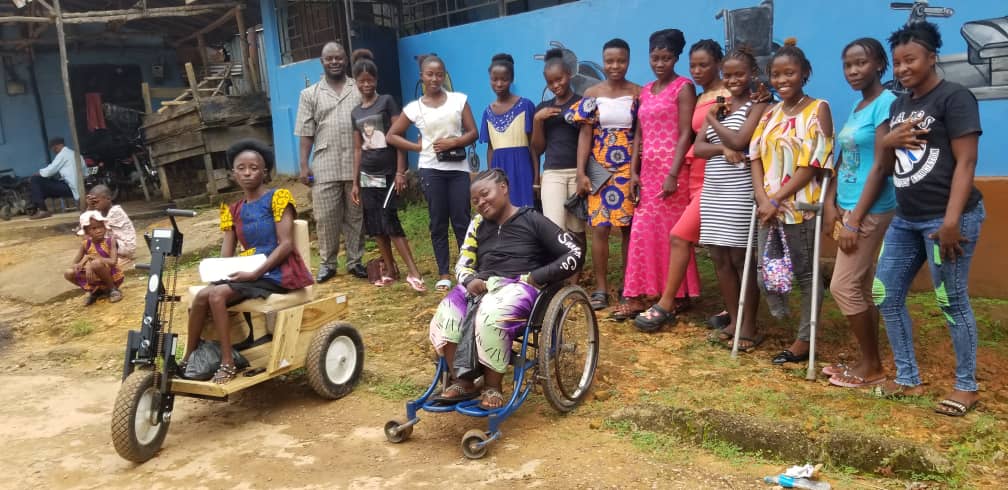
The historic ramifications of polio and the civil war have had a significant impact on the population of Bo City, with 10% living with a disability. There is a lack of access to prosthetic and assistive technologies (such as mobility carts and crutches) to support people, which can exacerbate their exclusion from work, education and therefore financial independence.
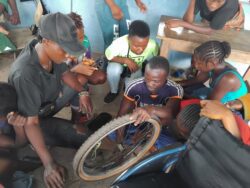
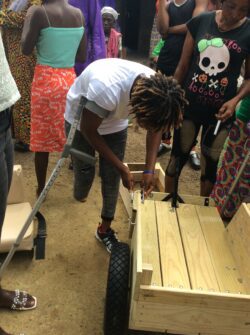 Alongside their core training in either hairdressing or tailoring, the women on our project are learning how to make adaptations to wheelchairs and mobility carts, fix wheel alignment and repair punctures, and under supervision by MSL instructors, will offer this service for free. The repairs will directly benefit the project participants and their dependents who use assistive technology, and also the wider community. In time we hope these repair skills will be cascaded to others, meaning increased wellbeing for disabled people and their caregivers over the long term.
Alongside their core training in either hairdressing or tailoring, the women on our project are learning how to make adaptations to wheelchairs and mobility carts, fix wheel alignment and repair punctures, and under supervision by MSL instructors, will offer this service for free. The repairs will directly benefit the project participants and their dependents who use assistive technology, and also the wider community. In time we hope these repair skills will be cascaded to others, meaning increased wellbeing for disabled people and their caregivers over the long term.
The trainees are also learning essential business skills, including business management, business planning, calculating profit and loss, how to set prices, basic bookkeeping, excellent customer service provision and marketing skills. This combined package, alongside the provision of sewing machines for the project will give the trainees the best opportunity to set themselves up in a competitive environment.
Meet Grace
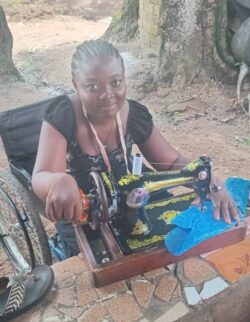
Grace with her sewing machine
Grace was diagnosed with polio as a child and was left with muscle weakness and impaired mobility. Grace and her mother (one of three wives in a polygamous household) were ostracised, and Grace was sent to live at the Leonard Cheshire International Home in the city of Bo. Under their care, Grace grew up and completed her high school education but when she returned to the family home, her father had passed away and she was received as a stranger. With no financial support, Grace couldn’t go on to study at university.
Grace had an interest in tailoring since childhood, and when she heard about our vocational training project with Mobility Sierra Leone (MSL), she hurried along to enrol. Using a sewing machine might have proved challenging for Grace, but she was determined not to let her disability hold her back. In fact, operating her sewing machine has brought some strength to the muscles in Grace’s arm.
Grace makes dresses which she can sell in her community to help support herself and her mother. Now she is recognised as a valuable member of her family: when there’s a family meeting, they wait for Grace before starting, and she’s invited to make contributions, which she does.
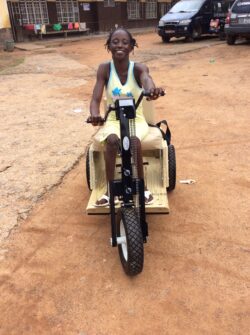
Nancy with her mobility cart
Meet Nancy
25 year old Nancy has mobility issues as a consequence of contracting polio. When she fell pregnant, Nancy and her boyfriend married, but he divorced her after other girls began deriding him for having married a disabled person. With no financial support, and stigmatized within her community, Nancy struggled to make ends meet for herself and her child.
Nancy heard about our project with MSL on local radio and joined our course in hairdressing. Now she is able to make money braiding the hair of people in her community, and her earnings mean she can support her daughter and pay the rent.
In addition, Nancy received a mobility cart, which means she can travel between her home and the MSL training centre for free. This means Nancy can save the money she would otherwise have to spend on transportation by commercial motorbike.
Meet Aminata
Aminata Tommy is 18 years old tailoring trainee. She went to school but was not able to continue when she was to go to high school due to lack of financial support. After becoming an amputee, life was not easy for Aminata. She has no food to eat and was forced to resort to begging for money.
Aminata believes that disability is not inability, and when she heard about our Tailoring project she was excited to start training.
Now Aminata can create dresses and sell them to earn an income. She has learned that understanding production costs is essential in calculating profits and establishing her selling prices.
Most of Aminata’s school friends marginalized her because of her impairment. Now she has new friends, joining the local female amputee football team for training every Saturday.
Each woman will graduate from our 12-month project equipped with a nationally recognized qualification and the technical and business skills to make her business a success, standing out from local competition in the bustling city of Bo. Crucially, women working in and owning successful businesses will not only have a livelihood, but will hold more agency and can use this to advocate for changes in attitude towards people living with a disability.
A recent MSL graduate told us; “I really enjoyed learning a new skill and using my hands to make furniture to a high standard. During the project I made and sold furniture that gave me financial independence I always dreamed of. I feel good about my future because I am now a skilful person.” – Keikula Sama, MSL carpentry trainee, 2021
We are excited to see what impact this project will have for our current trainees and the wider community.
Projects such as these would not be possible without you. If you would like to support our life-changing projects, please click here to give a one-off gift or set up a regular donation. Thank you.
July 2024